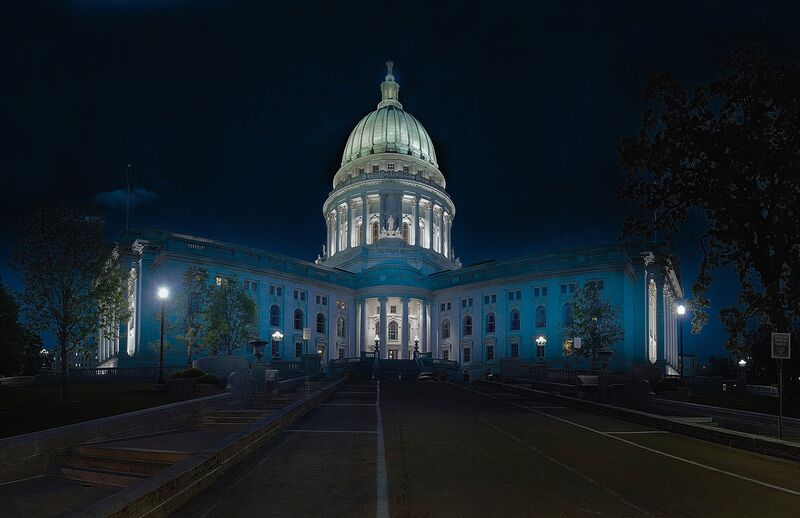As Wisconsinites, we have grown used to odd political moves, late-night sessions, and closed-door policymaking. But the events of last night and the early morning are stunning.
The state Republican legislature has managed to pull off a last-gasp struggle to consolidate power in Wisconsin. On Friday a 149-page pile of legislation magically appeared in the weekend news black hole. This legislation is a bald-faced attempt to maintain power with the Republicans despite the November election that put Democrats into every state-wide office. The Republicans held on to a majority in both legislative bodies only due to the gerrymandering that has defined Wisconsin politics since 2010. Apparently retaining control of 2 of the three governmental branches was not enough, as the proposed laws hobbled the powers of the new governor and the new Attorney General. The new proposals were very dense and contained a broad range of new state policy that would weaken the powers of the executive branch. An extraordinary session was called to enact these bills (the original justification for the session was to pass a bill to provide subsidies to Kimberly-Clark to retain a factory in the state, but it was clear that there would not be enough votes to pass the law).
Monday morning brought a sham of a public hearing on the bills. The state Republicans have perfected the art of holding public hearings where the legislators do not even pretend to have an interest in the testimony of their constituents. This hearing was particularly striking as over 1000 citizens asked that the bills be dropped, while a single citizen spoke in support of part of one of the bills. Still, the die had been cast, and testimony was as always ineffective. We have a legislature where one party is so certain they will remain in power that they have no interest whatsoever in how their constituents want them to vote.
Some of the Republican leaders continued to insist that the Democrats were simply whining about these bills and that the laws were merely intended to codify existing practice in the government and to restore a fair balance of power between the branches. The last eight years have been marked by a shifting of power to the Governor, to the Joint Finance Committee, and to the Department of Administration. It is wildly disingenuous for the party to claim at this point that they have suddenly seen the light on this and that they are simply correcting their own folly. If there is a problem of balance between the branches it is very odd that the GOP only noticed it when a Democratic governor was elected.
What I found much more truthful and convincing were some of the other statements by the party leaders, particularly Scott Fitzgerald claiming the legislation was necessary because "We don't trust Tony Evers right now" and Robin Vos claiming that if the legislation does not pass "we are going to have a very liberal governor who is going to enact policies that are in direct contrast to what many of us believe in." Plain and simple, the issue here is whether the new Governor will have the power to enact the changes that the electorate voted for.
Part of the all-night drama was caused by long recesses in which the Republicans kept re-writing the bills in an attempt to garner enough votes from their own party. Some of the bills were softened slightly (notably the packing of the WEDC board to maintain full control was changed to only be in effect until September, at which time the parties would have equal control, as well as some small changes to some of the other bills). Also, the bill that would have moved the presidential primary in an attempt to make it easier for a conservative state supreme court judge to be re-elected was scrapped after a huge negative response from clerks around the state and the Wisconsin Elections Commission. But at the end of the night, all of the other bills were passed with minor modifications and shipped over to the Assembly, where the fate of the bills was never really in doubt.
In the end, we are left with multiple new laws. Some of them, particularly the bill shortening in-person early voting, will probably be thrown out in court. The previous attempt at limiting early voting was overturned by the courts as discriminatory, and that will likely be the case again. Other bills will probably spawn new litigation, costing the state time, effort, and money. Other than the legal battles, this is a done deal. Over the next few days we'll explore what the practical implications of these laws will be.
Memberships
Files document Walker's failed record
From those intrepid researchers at One Wisconsin now comes the Scott Walker Failure Files, documenting his long record of failed leadership, mismanagement and skewed priorities. Here's the interactive website. Check it out. An amazing collection.
Last Week's disastrous bills
Dana Wachs and Katrina Shankland discuss the trifecta of horrors passed by the assembly last week. Still more coming next week. Halloween was never so frightening.
By the way - I highly recommend Dana's Wachs Talks series on Youtube. Great progressive discussion from a legislative hero (and great neighbor).
Steve is a member of LION Publishers , the Wisconsin Newspaper Association, the Menomonie Area Chamber of Commerce, the Online News Association, and the Local Media Consortium, and is active in Health Dunn Right.
He has been a computer guy most of his life but has published a political blog, a discussion website, and now Eye On Dunn County.



Add new comment